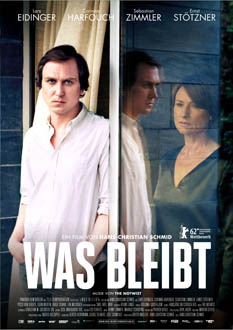
Starts September 6
Original language: German
 Gitte (Corinna Harfouch) and Günther (Ernst Stötzner) live in a beautiful home in a small town in southern Germany. Günther was a successful publisher. Now he is writing his own book about the Assyrians and the Sumerians and planning an extended trip to the Middle East to research it. Their son Jakob (Sebastian Zimmler) lives nearby and works in his dental practice which his parents financed. Their other son Marco (Lars Eidinger) drives in from Berlin and so the four settle down for a family weekend. Gradually small facts come to light. Gitte, who has been suffering a long-term psychiatric illness, announces that she has thrown away the pills and is fine without them. Perhaps she will go to the Middle East with Günther, who is less than thrilled, as he already has a younger, female travelling companion in the wings. Jakob finds dental work financially unsatisfactory; perhaps he chose the wrong profession. Marco seems to stand by his mother in her decisions, no matter what they may be. And so the conversations go round and round in the living room and on the beautiful pool-side terrace, (where the suns shines ALL THE TIME) until Gitte disappears and, after a short period of shock, Günther, Marco and Jakob go looking for her.
Gitte (Corinna Harfouch) and Günther (Ernst Stötzner) live in a beautiful home in a small town in southern Germany. Günther was a successful publisher. Now he is writing his own book about the Assyrians and the Sumerians and planning an extended trip to the Middle East to research it. Their son Jakob (Sebastian Zimmler) lives nearby and works in his dental practice which his parents financed. Their other son Marco (Lars Eidinger) drives in from Berlin and so the four settle down for a family weekend. Gradually small facts come to light. Gitte, who has been suffering a long-term psychiatric illness, announces that she has thrown away the pills and is fine without them. Perhaps she will go to the Middle East with Günther, who is less than thrilled, as he already has a younger, female travelling companion in the wings. Jakob finds dental work financially unsatisfactory; perhaps he chose the wrong profession. Marco seems to stand by his mother in her decisions, no matter what they may be. And so the conversations go round and round in the living room and on the beautiful pool-side terrace, (where the suns shines ALL THE TIME) until Gitte disappears and, after a short period of shock, Günther, Marco and Jakob go looking for her.
So, Was Bleibt, or What’s Left? as we would say in English. Not much, although German director Hans-Christian Schmid certainly did well considering what he had to begin with. This is basically a four-person conversation which could also be quite effective on a theater stage. All of the actors, especially Corinna Harfouch, one of Germany’s really good actresses, are fine. The setting, music, and camera work are fine. The basic problem is: who cares about any of these people? They have everything: comfort, money, each other, independence, time, and a life free of warfare, hunger or sickness. Still they are not satisfied; they must chew up each small thought down to the final prepositional phrase until nothing is left. And we don’t care; they fail to rouse any empathy. Perhaps Gitta has disappeared out of sheer frustration that everyone is so well-meaning and civilized on the surface. Perhaps she is looking for an exchange of four-letter words in loud voices and a gun shot or two. I know I would have appreciated that diversion. Somehow I expect more from a film which played in competition at the 2012 Berlinale.
